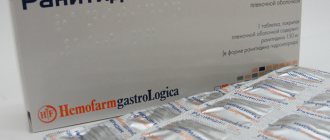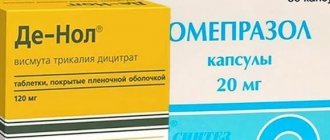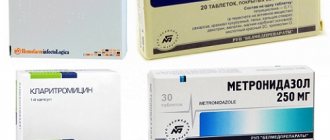- July 26, 2018
- Gastroenterology
- Julia Saap
Gastritis is a disease that is caused by inflammation of the gastric mucosa. The disease occurs for various reasons and proceeds in different ways. Doctors refer to a number of gastrointestinal diseases under the general name “gastritis” if the mucous membrane is damaged. Treatment of gastritis with Trichopolum is one of the methods of treating the disease. The medication destroys the bacterium Helicobacter pylori and is used for bacterial vaginitis, trichomoniasis, amebiasis, and anaerobic infections.
Gastritis: what is it?
A disease in which the gastric mucosa becomes inflamed is called gastritis. It leads to an imbalance in the gastrointestinal tract and impaired digestion of food. The disease occurs in acute and chronic forms. For gastritis, Trichopolum is the best treatment option. The active substances in the drug destroy the bacteria that causes the development of the disease. In acute gastritis, inflammatory changes occur in the stomach, which are caused by irritants. Chronic is accompanied by restructuring and atrophy of the mucous membrane. The danger of gastritis is that in the absence of proper treatment, as well as improper therapy, the disease leads to the death of the patient. Gastritis is also a cause of cancer in the gastrointestinal tract.
How can you cure gastritis with tablets?
Helicobacter pylori is the most common infection on the globe. Three billion people are currently infected with Helicobacter gastritis, which is almost half of the entire population of the planet; among Russians, the number of infected people exceeds 70%!
The disease causes inflammatory changes in the mucous membrane of the stomach and duodenum and is fraught with cancer. The chief freelance gastroenterologist of the Ministry of Health of Nizhny Novgorod, head of the gastroenterology department of Clinical Hospital No. 13, Elena Anatolyevna Kizova, spoke about whether it’s worth sounding the alarm or whether everything is not as scary as it might seem at first glance.
Infection with Helicobacter pylori occurs mainly in childhood, since children do not always wash their hands, they themselves bite an apple and give it to a friend, and the infection is greater the more crowded the population is, the less sanitary and hygienic rules are observed, explains Elena Kizova. “In addition, the risk of infection is great if someone in the family is sick. What happens with small children? Mom stirred the porridge, tested it for temperature, and gave this spoon to the child. Therefore, it is very important to wash your hands and wash dishes.
Causes
Doctors often prescribe Trichopolum for gastritis. The product is proven, inexpensive and actively used in the fight against the disease. Doctors list the main causes of acute gastritis as:
- Eating poor quality food, eating foods contaminated with pathogenic bacteria.
- Infections that enter the stomach with Helicobacter pylori, which causes increased acidity.
- Ingestion of toxic substances into the stomach.
- Drinking strong alcohol.
- Taking nonsteroidal medications.
- Dysbacteriosis.
- Impaired metabolism.
The causes of chronic gastritis are:
- Infections.
- Infection of the body with parasites.
- Unbalanced diet.
- Eating junk food, too spicy, fatty, hot.
- Alcoholism.
- Bad habits (smoking).
- Stress, neurosis, depression.
- Helminthic infestations.
- Uncontrolled use of medications.
- Stomach operations.
- Endocrine disorders.
- Heredity.
- Chronic diseases.
Symptoms
Is it possible to take Trichopolum for gastritis? This is one of the drugs that is prescribed by your doctor if you have certain symptoms. You should not self-medicate if you discover the presence of a number of typical symptoms characteristic of gastritis:
- Constant nausea.
- Vomit.
- Lack of appetite.
- Pain in the upper abdomen that is sharp or burning. It goes away or gets worse when eating.
- Bloating.
- Feeling of fullness in the stomach after eating.
- Unpleasant taste in the mouth.
- General weakness, irritability.
- There is a yellow or white coating on the tongue.
- Dramatic weight loss.
- Fever.
- Heart problems, low blood pressure.
- Drowsiness or insomnia.
If gastritis is treated incorrectly or if you hesitate to see a doctor, it can cause serious complications. Among them are internal bleeding, sepsis, anemia, pancreatitis, dehydration, anorexia, ulcers, and stomach cancer. That is why many doctors recommend Trichopolum and other drugs that need to be taken in combination for gastritis.
Prevention of gastritis
No one knows 100% how to cure gastritis, but doctors have determined precise recommendations on how to avoid this disease - these are timely treatment of diseases of the gastrointestinal tract, oral hygiene, a gentle regime, a change of job if working conditions are associated with hazardous production. At the first signs of disturbances in the digestive tract, you should consult a doctor.
Those suffering from indigestion should eat smaller portions as often as possible to reduce the secretion of stomach acid. In addition, you need to avoid any foods that are difficult to digest, in particular, you need to exclude spicy, sour, fried or fatty foods from your diet.
Alcohol abuse can cause irritation and destruction of the inner mucous membrane of the stomach, which leads to inflammation and bleeding, so it is worth sharply limiting its consumption.
You need to quit smoking. Smoking damages the protective lining of the stomach, making it more vulnerable and susceptible to the development of gastritis and peptic ulcers. In addition, smoking increases the production of stomach acid, slows down the healing process and increases the risk of stomach cancer.
Sources:
https://health.mail.ru/consultation/672341/
https://gastritinform.ru/www.nr-gazeta.ru/?id=3333
https://azbyka.ru/zdorovie/gastrit-simptomy-diagnostika-i-lechenie
https://medaboutme.ru/zdorove/publikacii/stati/sovety_vracha/kogda_nuzhny_antibiotiki_pri_gastrite/
https://www.obozrevatel.com/health/proctology-1/kak-podderzhat-kishechnik-pri-prieme-antibiotikov.htm
https://gastritinform.ru/doctorpiter.ru/diseases/240/
How to treat
Before prescribing treatment, it is necessary to determine the type of gastritis: acute or chronic. If the disease occurs as a result of poisoning, it is necessary to begin therapy with gastric lavage. The patient is recommended to diet and take antispasmodics. Gastritis can be purulent, chemical, catarrhal, bacterial. Special methods of therapy are used for each. The only thing that remains is to follow a gentle diet.
For the treatment of chronic erosive gastritis, Trichopolum is one of the few drugs that effectively and quickly copes with the disease. It not only eliminates the symptoms, but also fights the cause, that is, it destroys bacteria and harmful microorganisms. Therapy for the chronic form includes taking medications, eliminating the cause of the disease, following a diet, and spa treatment. Treatment of gastritis with folk remedies is also possible. Medications are prescribed by the doctor taking into account the acidity of the stomach. If it is elevated, it is advisable to take adsorbent, enveloping, antacid agents. If the acidity level is low, drugs are recommended that enhance the secretory function of the stomach.
Signs of gastritis caused by the bacterium Helicobacter pylori
Currently, this bacterium plays a leading role in the development of gastritis (more than 90% of cases of the disease). This microorganism is a spiral-shaped bacterium that feels most comfortable in the acidic environment of the stomach. In addition to gastritis, it can cause peptic ulcers of the stomach and duodenum, lymphoma and even cancer. This theory about the origin of gastritis is quite young, but today it is recognized as the leading one.
Scientist Barry Marshall, together with a group of researchers, received the Nobel Prize in Medicine in 2005 for the discovery of the connection between this bacterium and the development of gastritis. Microorganisms Helicobacter pylori penetrate the cells of the gastric mucosa and prevent the production of hydrochloric acid. In some people, over time, they form foci of ulceration, from which erosions and ulcers subsequently form. In other people, on the contrary, areas of atrophy appear that do not participate in the digestion process and do not produce hydrochloric acid and other enzymes. As a result, the tissue of the gastric mucosa is replaced by fibrous or scar tissue. Infection with the bacterium occurs when sharing the same household items or kissing.
Description of the drug
Doctors sometimes prescribe Trichopolum for gastritis if the disease is bacterial. The drug is not modern, but is still used. "Trichopol" is a synthetic antibacterial agent that is included in the complex therapy of gastritis. It is appropriate to use together with tablets that reduce stomach acidity. If gastritis is not caused by bacteria, these tablets are not prescribed. The active substance in the composition is metronidazole. It acts as an antibiotic. Nifuratel has become an analogue of the drug in modern medicine. The medicine "Trichopol" not only destroys bacteria, but also relieves inflammation.
The drug is considered universal, as it is used for bacterial infections, vaginitis, urethritis, peritonitis, abdominal abscess, after surgery, to prevent complications. "Trichopol" destroys the cellular structure of Giardia, dangerous bacteria that affect the human liver and intestines. The product inhibits the activity of anaerobic bacteria, trichomoniasis pathogens and other harmful microorganisms. "Trichopol" is not recommended for use by children under 18 years of age. If it is prescribed, the course of treatment is carried out under the supervision of a doctor.
How to support your gut while taking antibiotics
However, like any strong medicine, antibiotics also have their side effects. Especially often, people began to face the consequences of taking antibiotics when semi-synthetic penicillins in tablet form became widespread (before that, penicillin was administered in the form of injections).
Taking the pill does not require outside help, and people began to indulge in self-medication, and doctors began to prescribe antibiotics at any opportunity. One of the consequences was that patients, after completing treatment, encountered unpleasant consequences in the form of intestinal disorders. The reason is that antibiotics killed not only pathogenic bacteria, but also beneficial ones. As a result, a person develops so-called iatrogenic dysbiosis.
Peculiarities
Is it possible to take Trichopolum for gastritis? The peculiarities of treating the disease with this medicine are that it is antibacterial and antiprotozoal. The drug is prescribed only in combination to eradicate the bacterium Helicobacter pylori. "Trichopol" is not used without drugs that reduce stomach acidity. It should not be prescribed for the treatment of stomach and duodenal ulcers. The tablets are quickly absorbed in the intestines and reach their highest concentration within three hours after administration and are evenly distributed in the body. Completely excreted by the kidneys and liver after eight hours.
While taking Trichopolum, the patient's urine turns dark brown due to the presence of dyes in the composition. If the drug is used simultaneously with lithium preparations, it is necessary to monitor the level of the substance in the blood. Its excess leads to intoxication of the body. Trichopolum can enhance the side effects of some medications. It is dangerous to take it simultaneously with the active substances astemizole, terfenadine, disulfiram. Side effects include nausea, vomiting, ataxia, and convulsions.
Trichopolum
Trichopolum ®
(lat.
Trichopol
®) is an antibacterial antiprotozoal drug. The active ingredient is metronidazole.
Dosage forms of Trichopolum
Trichopolum is available in the following dosage forms:
- oral tablets containing 250 mg metronidazole
- vaginal tablets containing 500 mg metronidazole
- solution for infusion in ampoules of 20 ml containing 100 mg of metronidazole per ampoule (or 5 mg of metronidazole in one ml of solution)
- solution for infusion in 100 ml polyethylene bottles containing 500 mg of metronidazole in an ampoule (or 5 mg in 1 ml of solution)
Trichopolum activity against pathogenic microorganisms
Trichopolum is active against many pathogenic microbes, including:
- protozoa: Trichomonas vaginalis, Giardia intestinalis, Entamoeba histolytica, Lamblia spp.
- bacteria: Bacteroides fragilis, Bacteroides ovatus, Bacteroides thetaiotaomicron, Bacteroides vulgatus, Parabacteroides distasonis, Fusobacterium spp., Veillonella spp., Prevotella bivia, Prevotella buccae, Prevotella disiens, Eubacterium spp., Clostridium spp., Peptococcus spp., Peptostreptococ cus spp., Gardnerella vaginalis
Trichopolum is not active against: Actinomyces spp., Mobiluncus spp
.,
Propionibacterium acnes
.
Indications for use of trichopolum
- infections caused by protozoa:
- trichomoniasis
- giardiasis
- amoebiasis
- amoebic liver abscess
- peritonitis
- abscesses of the abdominal cavity and liver
- endometritis
- abscesses of the ovaries and fallopian tubes
- postoperative complications
- pneumonia, pleural empyema, lung abscess
- meningitis, brain abscess
- skin infections
- bone infections
- sepsis
- endocarditis
- on the colon
- during appendectomy
- during gynecological operations
in Helicobacter-associated gastric and duodenal ulcers, as part of complex therapy
Trichopolum for eradication of Helicobacter pylori
Trichopolum is sometimes prescribed as one of the antibiotics as part of complex therapy for the eradication of Helicobacter pylori
.
Trichopolum is not used in the eradication of Helicobacter pylori
outside of special regimens, without drugs that reduce gastric acidity.
Trichopolum is also not used in any form for the treatment of gastric and duodenal ulcers and gastritis in the absence of Helicobacter pylori in the patient.
According to the Maastricht Agreements, the active substance trichopolum, metronidazole, is recommended as one of the antibiotics for the eradication of
Helicobacter pylori.
However, in Russia, due to the very wide and not always correct use of metronidazole, the level of resistance to metronidazole is almost twice as high as the European average: 55.5% in Russia and 25.5% in Europe (Maev I.V., Vyuchnova E.S., Shchekina M.I.).
In Russia, it is recommended to use nifuratel in treatment regimens instead of metronidazole (Shcherbakov P.L.). Also, according to modern Russian Standards for the diagnosis and treatment of acid-dependent and Helicobacter pylori-associated diseases, trichopolum is allowed only in one of the “second-line” regimens (used if the patient had unsuccessful treatment of Helicobacter pylori
according to one of the “first-line” regimens): trichopolum according to 500 mg 3 times a day, bismuth tripotassium dicitrate 120 mg 4 times a day, tetracycline 500 mg 4 times a day and one of the proton pump inhibitors in a standard dosage (omeprazole 20 mg, lansoprazole 30 mg, pantoprazole 40 mg, esomeprazole 20 mg , rabeprazole 20 mg 2 times a day) for 10–14 days.
Methods of using trichopolum and dosage
Trichopolum tablets are taken orally without chewing during or after meals or with milk:
- Trichomonas vaginalis
infection - 250 mg 4 times a day for 5 days or 2 g once or 250 mg 2 times a day for 10 days - for Entamoeba histolytica
: - adults - 750 mg 3 times a day for 5–10 days
- children - 35–50 mg per kg of body weight per day, in three divided doses for 10 days
infection , the daily dose is divided into two doses, the duration of treatment is 5–10 days, the repeated course is after 4–6 weeks, the dose depends on age:
- children from 2 to 5 years old - 250 mg per day
- children from 6 to 10 years old - daily dose - 375 mg
- patients over 10 years old - 500 mg per day
- children under 12 years of age, including newborns - 7.5 mg of trichopolum per kg of body weight 3 times a day
- patients over 12 years old - 250–500 mg 3 times a day
- children from 0 to 5 years - 5 mg of trichopolum per kg of weight every 8 hours for 2 days
- children from 5 to 12 years old - 125 mg every 8 hours for 2 days
- patients over 12 years old - initially 1 g once, then 250 mg 3 times a day
Vaginal tablets are prescribed for adults. The Trichopolum tablet is removed from the packaging by cutting the film along the contour of the tablet, moistened with boiled cooled water and inserted deep into the vagina. Trichopolum therapy lasts no more than 10 days and is repeated no more than 2-3 times a year. The dose and duration of use depends on the disease:
- for trichomonas vaginitis, one vaginal tablet per day is used for 7-10 days in combination with taking trichopolum tablets orally
- for nonspecific vaginitis and bacterial vaginosis, one vaginal tablet per day for 7 days, if necessary in combination with oral trichopolum tablets
Use of Trichopolum during pregnancy and breastfeeding
Trichopolum is contraindicated in the first trimester of pregnancy; in the second and third trimesters it should be taken with caution only if the benefit to the pregnant woman outweighs the risk to the unborn child, given that metronidazole crosses the placenta.
FDA category of effect on the fetus is B. Trichopolum (metronidazole) is excreted into human milk, creating concentrations similar to those in blood plasma. May impart a bitter taste to breast milk. To exclude the effect of Trichopolum on the child, breastfeeding while taking Trichopolum and for another 2 days after the end is not recommended.
general information
According to the pharmacological index, trichopolum belongs to the groups “Other synthetic antibacterial agents” and “Medicines for the correction of disorders in alcoholism, toxic and drug addiction”, according to the ATC - to the subgroup “J01XD01 metronidazole” of the group “Imidazole derivatives”, as well as to the subgroup “A01AB17 metronidazole "Group "A01AB Antimicrobials for local treatment of diseases of the oral cavity."
Trichopolum has contraindications, side effects and application features; consultation with a specialist is necessary.
Company manufacturer
trichopolum - Polpharma, Poland (JSC Akrikhin).
On the website gastroscan.ru in the literature catalog there is a section “Antibiotics used in the treatment of gastrointestinal diseases”, containing articles on the use of antimicrobial agents in the treatment of diseases of the digestive tract.
Instructions for medical use of trichopolum
Instructions for medical use of various dosage forms of Trichopolum from the manufacturer (pdf):
- "Trichopol", tablets containing 250 mg of metronidazole
- "Trichopol", solution for infusion containing 5 mg of metronidazole in 1 ml
- "Trichopol", vaginal tablets containing 500 mg of metronidazole
Other medicines containing the active ingredient metronidazole
Bacimex, Deflamon, Klion, Metrovagin, Metrogyl, Metroxan, Metrolacare, Metron, Metronidazole, Metronidazole IV Brown, Metronidazole Nycomed, Metronidazole-AKOS, Metronidazole-UBF, Metronidazole tablets 0.25 g, Metronidal, Metroseptol, Orvagil, Rosamet, Rozeks, Siptrogil, Tricho-PIN, Trichobrol, Trichosept, Flagyl, Efloran. Back to section
How to use
One Trichopolum tablet contains 250 mg of metronidazole (active substance), potato starch, magnesium stearate, gelatin, and starch syrup. How to take Trichopolum for gastritis? The most common regimens include taking the drug 250 mg four times a day or 500 mg twice a day during and after meals. The maximum period of treatment is fourteen days. Patients diagnosed with liver or kidney failure require an individually selected treatment regimen. High concentrations of the active substance in the liver can lead to coma. In elderly patients, the dose of metronidazole should be reduced. During treatment with the drug, you should not drink alcohol. After taking Trichopolum, candidiasis of the digestive tract sometimes develops. In this case, the doctor prescribes antifungal agents. The medicine causes weakness, dizziness, psychomotor reactions decrease, confusion occurs, and convulsions appear.
Use of the drug Trichopolum for the treatment of gastritis of the stomach
Gastritis or inflammation of the mucous membrane lining the inside of the stomach is one of the most common pathologies of the gastrointestinal tract. As studies have shown, one of the main causes of the development of the disease is a bacterium with the beautiful name Helicobacter pylori.
For this reason, antibiotics are the mainstay of treatment for the disease. Let's figure out in what cases Trichopolum is prescribed for gastritis and whether it is advisable to use this drug.
Description of the drug
Trichopolum is a popular drug with antiprotozoal and antibacterial activity. The active substance is metronidazole. Used in the treatment of certain parasitic and infectious diseases caused by microflora that are sensitive to it.
The use of Trichopolum in the treatment of gastritis makes sense provided that the bacterial nature of the disease is confirmed. If the examination does not reveal the presence of bacteria, then the use of antibiotics is not advisable.
Helicobacter pylori is highly resistant to antibacterial drugs, so two antibiotics and additional agents are prescribed simultaneously to treat the infection. Trichopolum is prescribed as one of the antibiotics as part of complex therapy. Additionally, the following drugs are used:
- Amoxicillin. A drug from the penicillin series.
- Clarithromycin. Belongs to the macrolide series.
- Erythromycin. Also a drug from the macrolide class.
- Tetracycline.
Operating principle
The active substance of the drug penetrates the cells of bacteria and protozoa, blocking the production of DNA in them, this leads to the death of microorganisms. At the same time, the substance does not have a negative effect on human tissue cells. The severity of the antimicrobial effect depends on the concentration of the active substance in the blood.
When taken orally, the drug is almost completely absorbed into the blood through the intestines. The maximum concentration develops within 1-2 hours after administration. The active substance is able to penetrate the placental and blood-brain barrier.
The active component is processed in the liver, most (up to 80%) is excreted in the urine, the rest through the intestines. With long-term use, it can accumulate in tissues.
Treatment regimen for gastritis
Treatment of gastritis with Trichopolum is advisable only in combination with an additional antibiotic and drugs to normalize the composition of gastric juice. Using Trichopolum for monotherapy does not make sense.
Advice! If metronidazole is used incorrectly, Helicobacter pylori bacteria become resistant to the antibiotic. Therefore, if therapy is ineffective, it must be replaced.
Contraindications
Many patients are interested in: “Trichopol” treats gastritis or not? The drug is used if the cause of the disease is the bacterium Helicobacter pylori, various infections, and the treatment regimen prescribed by the doctor does not help. You cannot take Trichopolum if the patient has blood diseases, impaired coordination of movements, is diagnosed with liver failure, or central nervous system diseases. Individual intolerance to the active substance is an absolute contraindication for use. If gastritis appears during pregnancy, the disease must be treated with Trichopolum very carefully. In the first trimester, its use is prohibited. In the second, you can take the medicine if the benefits to the woman outweigh the risks to the fetus. The medicine quickly penetrates the placenta and is excreted into milk, so it should not be used during lactation.
Side effects
Trichopolum is usually well tolerated, but sometimes patients note the development of negative side effects. Most often, unpleasant consequences are associated with digestion, it is noted:
- nausea;
- loss of appetite;
- bowel disorders;
- intestinal colic;
- feeling of dry mouth.
Unpleasant symptoms from the central nervous system occur less frequently:
- disturbance of consciousness;
- loss of coordination;
- irritability;
- headaches and dizziness;
- sleep disorders.
If you are intolerant to the drug, allergic reactions may develop in the form of redness of the skin, the appearance of a rash, and also pain in the joints. When antibiotic therapy, one should take into account the fact that during the treatment, not only pathogenic microorganisms die, but also “good” bacteria that are part of the intestinal microflora.
This leads to the development of dysbiosis. To eliminate negative consequences, along with antibiotics, bifidobacteria and lactobacilli are often prescribed for preventive purposes. In addition, it is recommended to consume fermented milk products daily, which have a beneficial effect on the intestinal microflora.
Reviews
Is it worth taking Trichopolum for gastritis? Reviews from patients who have undergone therapy with various drugs indicate that the medicine really helps with gastritis caused by the bacterium Helicobacter pylori and various infections. Tablets eliminate symptoms and attack the cause of the problem. You should take the medicine only as prescribed by your doctor. The advantages of Trichopolum include low price and versatility. It successfully treats sexually transmitted diseases. Disadvantages include the presence of contraindications and side effects.
Trichopolum for gastritis
"Trichopol" is used for gastritis quite rarely, which is due to the resistance of the Russian body to metronidazole. Just like other medications, the drug has a number of specific contraindications and side effects. In any case, you must visit a doctor before using the drug.
It is recommended by the Maastricht Treaty as one of the antibiotics for the eradication of Helicobacter pylori. But in Russia, due to the popularity of self-medication, Metronidazole is often used very widely and for other purposes, so resistance to the drug is twice as high as in Europe. This fact explains why Trichopolum for gastritis in our country is prescribed to patients less and less often. Russian doctors, when drawing up therapeutic regimens, give their preference to another drug - Nifuratel. Treatment of gastritis with Trichopolum is carried out only when the first line does not work and there is a need to correct it by making a replacement. This drug is taken for gastritis three times a day, 500 mg. The course lasts two weeks.
"Trichopol" is used for gastritis quite rarely, which is due to the resistance of the Russian body to metronidazole










